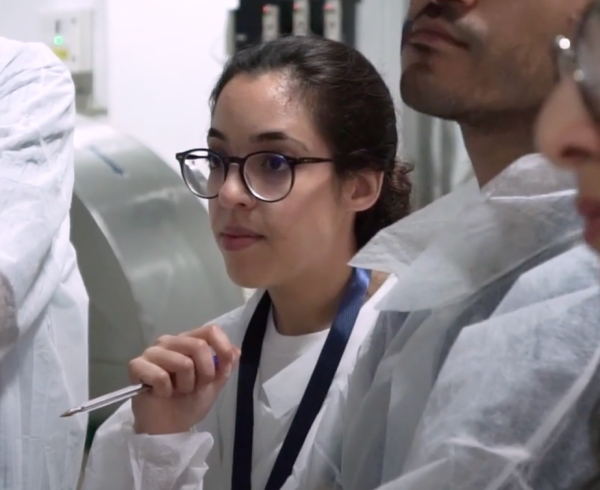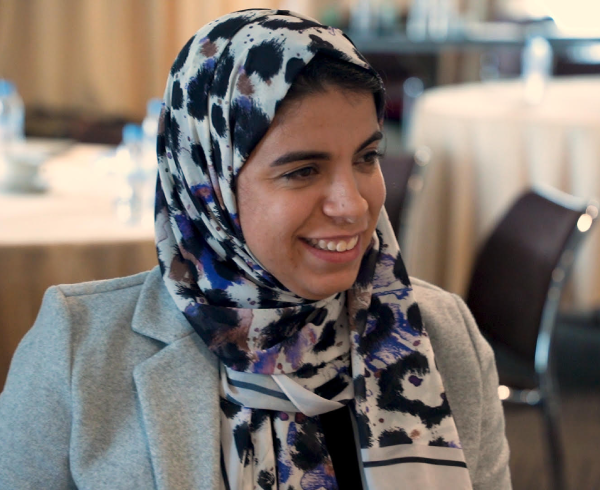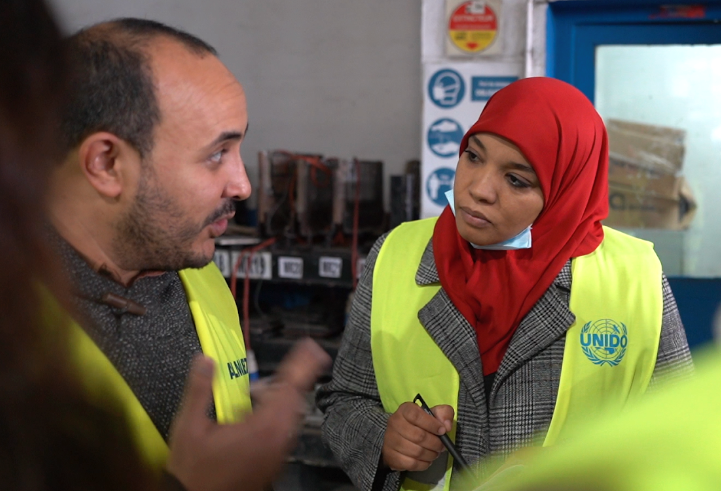Meet the women leading transformational change in Morocco
Across the world, women remain underrepresented in the fields of technology and engineering. But in Morocco, where many females are still even denied the right to work, a growing number of professional women are gaining the skills and opportunities they need to help their country achieve a clean and sustainable future.
Women are vital actors in the green transition. Increasing female involvement means a wider array of talent and perspectives can contribute to finding much-needed solutions to the climate crisis, including how to slash the carbon emissions generated by manufacturing industries. That’s why the Industrial Decarbonization Accelerator is committed to providing opportunities for women to participate.
For each of the three UNIDO-led Energy Management System (EnMS) training programmes that have taken place in Morocco, women have been well represented. Companies benefiting from the training were encouraged to nominate women, and training was adapted to their needs. As a result, around one in five training participants were women.
Meet the women who are making headway in a male-dominated industry and are determined to cut down energy waste in Morocco.
Wiame Fathi
Energy Optimization and Qualification Manager at Sothema

“Once the mindset evolves, everything else falls into place.”
Wiame Fathi followed her passions and started her career by completing a master’s degree at the National School of Applied Sciences in El Jadida, Morocco. With her degree in energy and electrical engineering in hand, she joined the engineering team of the pharmaceutical company Sothema, firstly as an intern. At the time Sothema was looking for ways to become more energy efficient, and the impressive Wiame was hired as an energy optimization manager.
To further hone her knowledge and skills, Wiame took part in UNIDO’s EnMS programme in 2019. Wiame says the training “made a huge difference.” She particularly appreciated the trainers’ expertise: “They already knew the challenges that our industries faced and gave their best to teach us how to address them in a very practical manner while transforming these challenges into opportunities.”
Wiame enjoyed the diversity of the training modules: a mix of classroom training, virtual webinars, workshops and hands-on learning experiences in the field and on the factory floor. She speaks enthusiastically about the chance Sothema received to be audited by the entire EnMS training team, participants and trainers included. “This was extremely helpful as it gave me a jump-start in strategizing on how best we can reduce our energy use, carbon emissions and operational costs,” she adds.
Today, Wiame continues to put the skills she learned to use. “With the help of UNIDO tools, I am working, alongside our engineering team, on the implementation of an energy management system so that Sothema can be certified according to the ISO 50001 standard,” she explains. “This will improve how Sothema tracks, measures and analyzes its energy consumption. Thanks to this knowledge, our KPIs in terms of energy efficiency and renewable energies will be better and will positively impact the decisions made by Sothema and its investments in that field.”
When it comes to transforming the energy sector, Wiame follows the advice of Mahatma Ghandi: “If you want to change the world, start with yourself”. As a strong believer in awareness raising to induce change, Wiame is leading campaigns so that colleagues at all levels, be they managers, operators, technicians or other staff, are sensitive to the vital need for energy efficiency across the company’s operations. “Once the mindset evolves, everything else falls into place,” she says.
Wiame says she has encountered several challenges working in a male-dominated field. She remembers often being the only woman in the room. But she underscores the precious support that she has enjoyed from her CEO since joining Sothema. “We Sothemians are very privileged to be led by a woman CEO, Mrs. Lamia Tazi, who is a wonderful mentor to me and all her employees, especially women. Since day one, Mrs. Tazi has demonstrated unique leadership and a keen interest in making Sothema environmentally friendly by investing in energy efficiency, among other projects”, she says.
Wiame’s advice to women who want to pursue a similar career path? “Develop your communication and collaboration skills, practice active listening and improve yourself continuously. Take action and be an agent for change. Follow your intuition and keep shining!”
Meryem Radouane
Environmental Health and Safety Coordinator, Maphar CFAO Healthcare

“Women with a green skill-set, like industrial energy efficiency expertise, have greater opportunities than in the past to take on leadership roles.”
As women and girls in many countries have fewer resources than men, they are often more impacted by the impacts of climate change. It is no surprise then that many young women have taken it upon themselves to accelerate change and lead the clean energy transition. One such woman is Meryem Radouane, an eco-energy and industrial environment engineer.
Meryem has dedicated her career to protecting the environment by driving industrial energy efficiency to reduce harmful climate change. During her current tenure at Maphar CFAO Healthcare she is working closely with the energy team to devise and implement an energy optimization programme to slash the carbon footprint of her company in half by 2030.
Meryem believes that the role of women in the field of energy in Morocco is changing. “Women with a green skill-set, like industrial energy efficiency expertise, have greater opportunities than in the past to take on leadership roles within entities focused on energy conservation or sustainability initiatives,” she says. Training and capacity building is key to stay on top of the game, especially for sectors like energy which undergo constant innovation.
Enthusiastic about acquiring new green skills, Meryem enrolled in UNIDO’s EnMS training programme. The course guides its participants through a hands-on process of action planning, implementation and continuous energy saving improvements in line with ISO 50001 requirements. “The training was very enriching and interesting. The new learnings will help to steer my company towards a new energy efficiency path,” says Meryem.
Meryem is a strong advocate of women-led networks to promote women’s agency and leadership in the energy transition. “Women professionals can leverage on such networks to share best practices and innovative solutions for improving energy efficiency in Moroccan industries,” she explains. Meryem is opening doors for aspiring young women in the energy sector: “It is my responsibility to be a mentor and empower the next generation.”
Meryem advises women who want to take a similar career path to gather the right knowledge and skills. “Your network [contacts] are the best allies that you could have,” she adds, “so pursue the relevant education, gain practical experience through internships, develop diverse skills to grow, network with professionals in the field – and, finally, stay resilient in the face of challenges.”
Meryem Lalouf
Industrial performance manager at Vinaigrerie Moutarderie du Maroc

“Meeting the climate and environmental challenge will require an equal participation of women in the energy sector.”
All her life, Meryem Lalouf has been breaking barriers, from graduating in industrial automation and computer engineering to excelling in a traditionally male- industry. She knows how essential it is for women to play a role in reducing Morocco’s greenhouse gas emissions and meeting its national climate pledges under the Paris Agreement.
Meryem first entered the food production company Vinaigrerie Moutarderie du Maroc (VMM) as a design office and methods technician. Her sharp eye for energy optimization was quickly spotted, and Meryem rose to the position of industrial performance manager. In this leading role, she is responsible for identifying and implementing strategies for maximizing industrial energy efficiency. Her successes include modernizing steam circuits, upgrading compressed air systems and rolling out LED lighting, all of which have reduced energy consumption and increased the company’s productivity and competitiveness.
To expand her knowledge and skills, Meryem is undertaking the UNIDO-supported EnMS training where she has learned how to establish practices to improve energy performance. “Rolling out the EnMS will help us better manage our energy consumption and continuously increase our productivity,” she says. Thanks to the training, VMM and other Moroccan companies will be able to develop policies to achieve greater energy efficiency, evaluate the results and review policy effectiveness. This is the key to continuously improving energy efficiency, one step at a time.
The extensive training curriculum gave Meryem, and her fellow trainees in the 60-person cohort, expert knowledge on how to improve industrial energy efficiency, use renewable energy and recovery energy to diversify the energy mix, and utilize recycled materials for industrial companies. Optional courses on steam systems optimization and motor systems optimization were also provided.
Meryem is deeply aware of the major climate and environmental challenges her country and the world face. With these new skills she will be ready to hit the ground running to help her company contribute to meeting Morocco’s energy efficiency goals. Her work will help Morocco achieve its National Energy Efficiency Strategy, which aims to decrease the country’s energy consumption by 20 per cent by 2030, with around half of these savings coming from industry.
Meryem is convinced that women have the power to tackle her country’s challenges and is a strong advocate of female empowerment. “Meeting the climate and environmental challenge will require an equal participation of women in the energy sector,” she says.
Having to fight to overcome gender stereotypes throughout her career, Meryem’s goal is to give women, particularly young women, the opportunity to understand her field and the challenges it faces. She is a strong believer in the importance of role-models to inspire more women to enter technical and engineering fields – and ultimately to encourage more women to be ambitious and follow their passions.